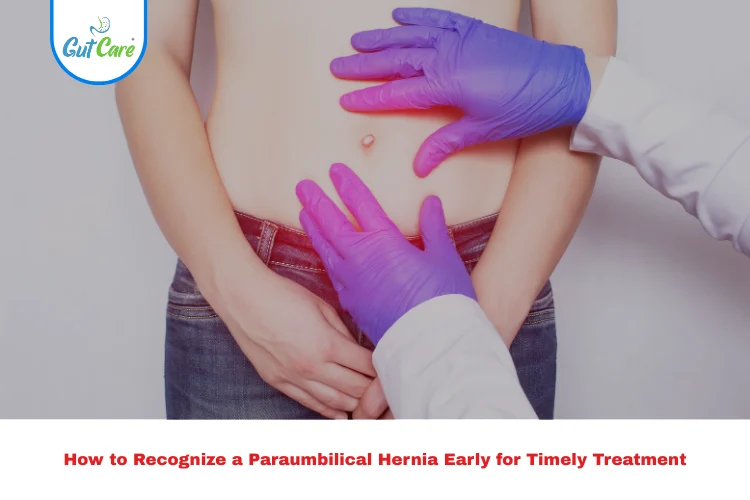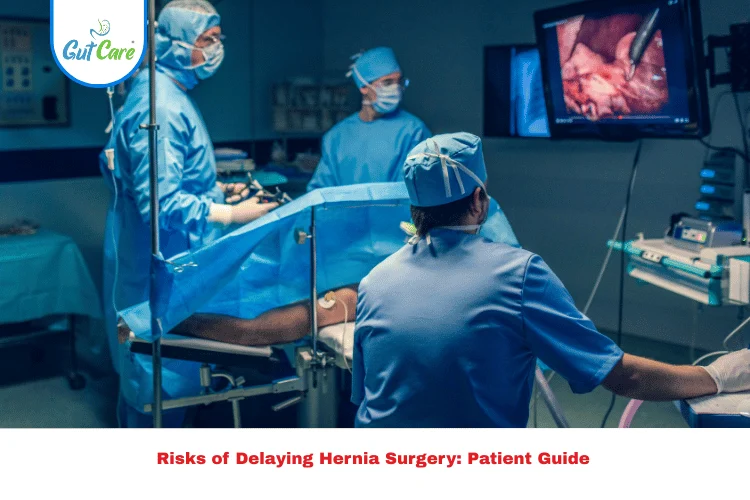Paraumbilical hernia is a condition of the abdominal wall next to the navel. Prompt diagnosis of this hernia symptoms and its treatment is imperative to prevent complications. At Gutcare Clinics Bangalore, our surgery specialist, Dr. Yuvrajsingh Gehlot, states that it is imperative that you are aware of paraumbilical hernia symptoms to mitigate the risk of complications.
Understanding Paraumbilical Hernia
A paraumbilical hernia occurs when tissue or fat from within the abdomen protrudes through a weak point of the abdominal wall by the belly button. These can occur at any age; however, they are more common in adults and especially seen in women who have been pregnant multiple times and those who are obese.
Paraumbilical Hernia vs Umbilical Hernia
Many people mix up paraumbilical hernia with umbilical hernia, but they are different:
Umbilical Hernia – Usually occurs in infants, it forms at the navel area, and most close naturally by age 3-4.
Paraumbilical Hernia – will typically occur in adults, it forms slightly above and below the navel area, it will rarely close on its own.
Understanding these differences brings timely care for doctors and patients.
Early Paraumbilical Hernia Symptoms
Identifying early symptoms is important. Many patients show some of the following symptoms related to paraumbilical hernias:
Bulge Near the Navel: A bulge or swelling near the belly button that is usually visible when the patient is coughing, bending over or doing work.
Discomfort or Pain: There may be mild pain or pressure in the abdomen, especially during physical activities.
Digestive Problems: Occasionally, patients report tummy trouble such as bloating, nausea, or inability to pass stools if the hernia is compressing the neighboring structures.
Tenderness or Redness: Rarely, the skin above the hernia can be tender or slightly discolored.
Causes and Risk Factors
The failure of the abdominal wall at the level of the umbilicus can happen due to increased pressures in the abdomen, which can occur from:
- Obesity
- Pregnancy or multiple pregnancies
- Chronic cough
- Lifting heavy items
- History of abdominal surgery
Identifying these risk factors and then addressing them will allow for a reduced risk for further progression or recurrence.
Diagnosis and Medical Consultation
Proper assessment by a hernia specialist is key to early detection, for example, by Dr. Yuvrajsingh Gehlot at Gutcare Clinics. The evaluation process usually involves:
Physical Examination: The doctor will palpate for bulges and note size and limitations.
Imaging Tests: An ultrasound or CT study, to confirm the hernia and its contents.
You should not ignore minor symptoms, small paraumbilical hernias will grow and have complications.
Paraumbilical Hernia Treatment Options
Treatment depends on the hernia size, severity, and symptoms:
Non-Surgical Approaches
Lifestyle Modifications: Weight management, avoiding heavy lifting, and dietary changes.
Supportive Belts: Hernia belts can temporarily reduce discomfort but do not cure the hernia.
Surgical Treatment
Surgery is the permanent solution, especially for larger hernias or when hernias are painful. You have the choice of:
Open Hernia Repair: The hernia is pushed back in, and the abdominal wall is reinforced with sutures or mesh.
Laparoscopic Surgery: Minimally invasive surgery with rapid recovery and smaller scars.
Dr. Yuvrajsingh Gehlot, a premier hernia surgeon, commonly performs both types of surgery at Gutcare Clinics. Both options have a high success rate!
Preventing Paraumbilical Hernia Recurrence
Post-treatment care and lifestyle changes are crucial:
- Maintain a healthy weight
- Avoid straining during bowel movements
- Strengthen the abdominal muscles gradually
- Follow doctor’s instructions regarding physical activity and lifting
If signs of recurrence are detected early, and consistent care is provided, the risk of recurrence will be greatly reduced.
Summary
When you recognize early paraumbilical hernia symptoms (bulging near your navel, some discomfort, or changes in your digestive system) you minimize the chance of serious complications. In addition to knowing the symptoms, it’s also important to understand the difference between paraumbilical hernia vs umbilical hernia (in relation to treatment). While lifestyle changes may help your situation, paraumbilical hernia treatment usually ends in surgical intervention. Consult an experienced hernia specialist like Dr. Yuvaraj Gehlot at Gutcare Clinics in Bangalore to ensure you receive safe and effective care.
Ultimately, taking action early, monitoring symptoms and consulting with your expert are the keys to a comfortable life avoiding complications.
FAQs
1. What is the difference between a paraumbilical hernia and an umbilical hernia?
A paraumbilical hernia occurs next to the belly button but not directly at the belly button. These hernias are common in adults but are also seen in infants. An umbilical hernia occurs at the belly button, and is more commonly seen in infants.
2. What are the common paraumbilical hernia symptoms?
Symptoms can include a bulge next to the belly button, little pain or pressure, tenderness, and sometimes gastrointestinal symptoms like bloating.
3. Can a paraumbilical hernia heal without surgery?
Small hernias that do not cause pain can stay asymptomatic, and a short change in activity or lifestyle may aid in limiting symptoms. In these situations, surgery is also often preferable to limit enlargement or possibly other complications.
4. Who should I consult for paraumbilical hernia treatment?
Consult a hernia specialist. Dr Yuvrajsingh Gehlot at Gutcare Clinics, Bangalore for paraumbilical hernia treatment.
5. How does Gutcare Clinics treat paraumbilical hernia?
Depending on the size and severity of your hernia we would employ an initial set of options including lifestyle modification modification, supportive abdominal belts, and tactile procedure (however, surgery if successful is always preferable in both small and large hernias.). In cases of larger, larger or symptomatic hernias we would prefer either an open or laparoscopic procedure done by our surgeons.




